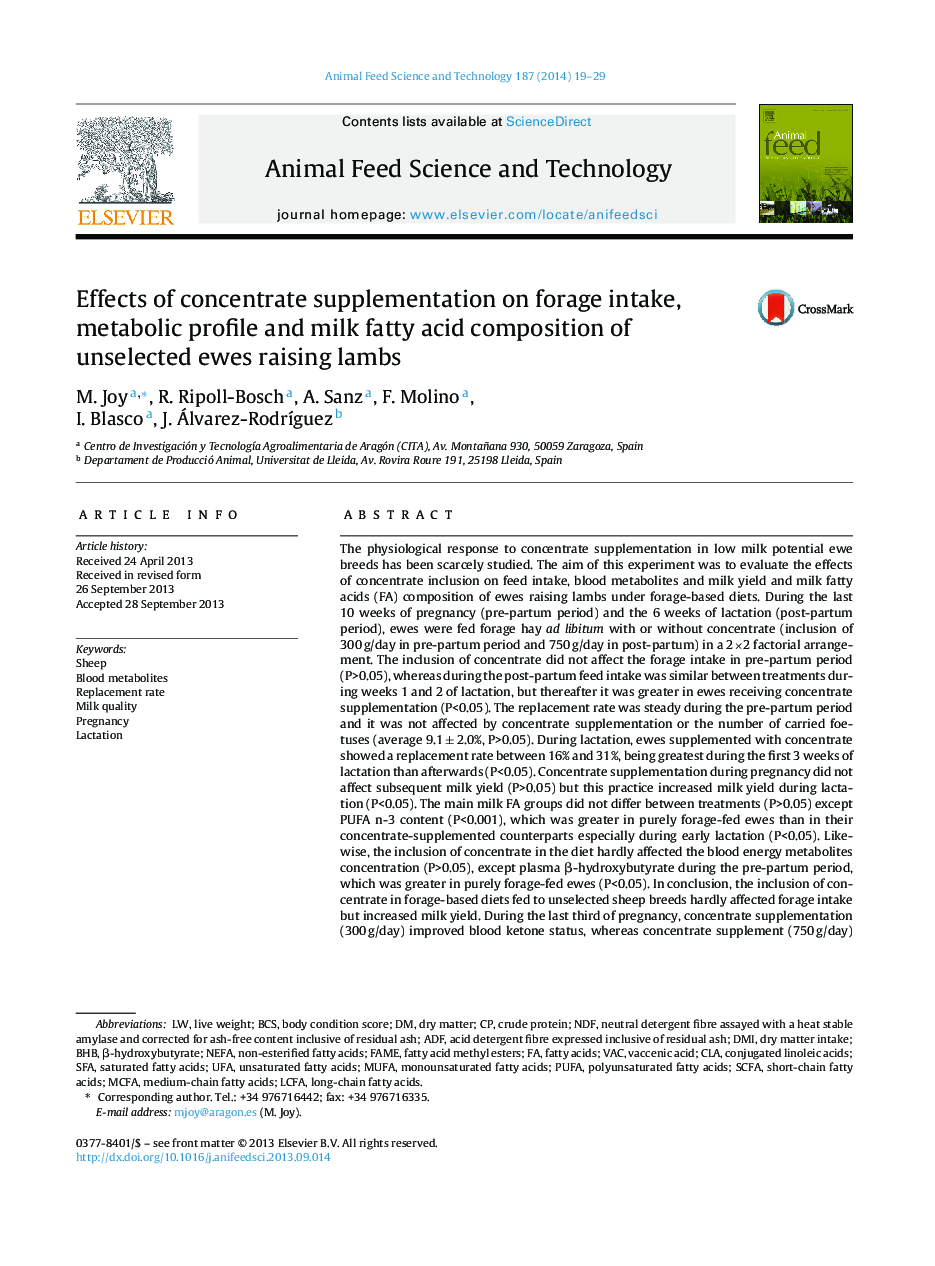| کد مقاله | کد نشریه | سال انتشار | مقاله انگلیسی | نسخه تمام متن |
|---|---|---|---|---|
| 8491777 | 1552398 | 2014 | 11 صفحه PDF | دانلود رایگان |
عنوان انگلیسی مقاله ISI
Effects of concentrate supplementation on forage intake, metabolic profile and milk fatty acid composition of unselected ewes raising lambs
ترجمه فارسی عنوان
اثرات مکمل کنسانتره بر میزان مصرف علوفه، پروفایل متابولیک و ترکیب اسید چرب شیر از جوجه های انتخاب نشده بره های بره
دانلود مقاله + سفارش ترجمه
دانلود مقاله ISI انگلیسی
رایگان برای ایرانیان
کلمات کلیدی
BHBβ-hydroxybutyrateSCFACLAVACLCFAMUFAMCFANEFASFAUFADMINDFADFPolyunsaturated fatty acids - اسید چرب اشباع نشدهPUFA - اسید چرب چند غیراشباعconjugated linoleic acids - اسیدهای لینولئیک کنجوج شدهFatty acids - اسیدهای چربsaturated fatty acids - اسیدهای چرب اشباع شدهLong-chain fatty acids - اسیدهای چرب بلند زنجیره ایnon-esterified fatty acids - اسیدهای چرب غیر استرادیدهUnsaturated fatty acids - اسیدهای چرب غیر اشباعmonounsaturated fatty acids - اسیدهای چرب غیر اشباعMedium-chain fatty acids - اسیدهای چرب متوسطShort-chain fatty acids - اسیدهای چرب کوتاه مدتacid detergent fibre expressed inclusive of residual ash - الیاف پاک کننده اسید بیانگر شامل خاکستر باقی مانده استPregnancy - بارداریBCs - روند BCsLactation - شیردهیdry matter - ماده خشکBlood metabolites - متابولیت های خونfatty acid methyl esters - متیل استرهای اسید چربFAME یا fatty acid methyl esters - متیل استرهای اسید چربdry matter intake - مصرف ماده خشکReplacement rate - نرخ جایگزینیBody condition score - نمره وضعیت بدنVaccenic acid - واکسن اسیدLive weight - وزن زندهcrude protein - پروتئین خامMilk quality - کیفیت شیرSheep - گوسفند
موضوعات مرتبط
علوم زیستی و بیوفناوری
علوم کشاورزی و بیولوژیک
علوم دامی و جانورشناسی
چکیده انگلیسی
The physiological response to concentrate supplementation in low milk potential ewe breeds has been scarcely studied. The aim of this experiment was to evaluate the effects of concentrate inclusion on feed intake, blood metabolites and milk yield and milk fatty acids (FA) composition of ewes raising lambs under forage-based diets. During the last 10 weeks of pregnancy (pre-partum period) and the 6 weeks of lactation (post-partum period), ewes were fed forage hay ad libitum with or without concentrate (inclusion of 300 g/day in pre-partum period and 750 g/day in post-partum) in a 2Ã2 factorial arrangement. The inclusion of concentrate did not affect the forage intake in pre-partum period (P>0.05), whereas during the post-partum feed intake was similar between treatments during weeks 1 and 2 of lactation, but thereafter it was greater in ewes receiving concentrate supplementation (P<0.05). The replacement rate was steady during the pre-partum period and it was not affected by concentrate supplementation or the number of carried foetuses (average 9.1 ± 2.0%, P>0.05). During lactation, ewes supplemented with concentrate showed a replacement rate between 16% and 31%, being greatest during the first 3 weeks of lactation than afterwards (P<0.05). Concentrate supplementation during pregnancy did not affect subsequent milk yield (P>0.05) but this practice increased milk yield during lactation (P<0.05). The main milk FA groups did not differ between treatments (P>0.05) except PUFA n-3 content (P<0.001), which was greater in purely forage-fed ewes than in their concentrate-supplemented counterparts especially during early lactation (P<0.05). Likewise, the inclusion of concentrate in the diet hardly affected the blood energy metabolites concentration (P>0.05), except plasma β-hydroxybutyrate during the pre-partum period, which was greater in purely forage-fed ewes (P<0.05). In conclusion, the inclusion of concentrate in forage-based diets fed to unselected sheep breeds hardly affected forage intake but increased milk yield. During the last third of pregnancy, concentrate supplementation (300 g/day) improved blood ketone status, whereas concentrate supplement (750 g/day) during the 6 weeks of lactation did not improve the ewe nutritional status. A mild decrease in milk polyunsaturated fatty acids n-3 was observed due to concentrate feeding. In this context, concentrate supplementation should only be recommended to improve the nutritional status before lambing but this practice failed to counteract lactation demands during the post-partum period.
ناشر
Database: Elsevier - ScienceDirect (ساینس دایرکت)
Journal: Animal Feed Science and Technology - Volume 187, January 2014, Pages 19-29
Journal: Animal Feed Science and Technology - Volume 187, January 2014, Pages 19-29
نویسندگان
M. Joy, R. Ripoll-Bosch, A. Sanz, F. Molino, I. Blasco, J. Álvarez-RodrÃguez,
